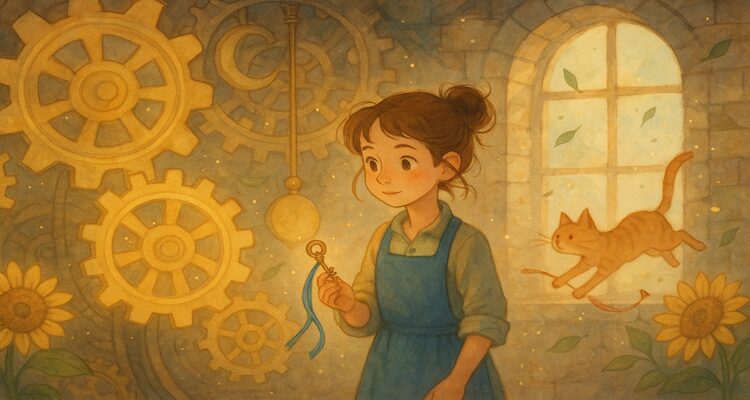The Clockmaker’s Daughter Who Stopped Time
A clockmaker’s daughter who learns to stop time, fix a troubled clock tower, and discover that kindness, courage, and listening make every moment meaningful.
In the cheerful town of Thistle wick, the air always hummed with clocks. There were tiny thimble-clocks that chimed like tea spoons, porch clocks that clucked like friendly hens, and the tall tower clock in the square that sang a gentle tune at the top of every hour. In a little shop called “Merrin & Moments,” a girl named Mira Merrin helped her father, a kind clockmaker with oil on his fingers and a smile as warm as morning sunlight.
Mira loved the secret language of clocks their little heartbeats of tick and tock, their shy whirrs and brave bongs. She dusted them, listened to them, and sometimes sang back to them while her father told stories.
“Time is more than numbers,” Papa would say, tapping a dial. “Time is what we do with each moment. We fill it with kindness, courage, and curiosity.”
Mira nodded, storing his words like precious marbles in her pocket.
One morning, as the town prepared for the Sunflower Fair, Papa handed Mira a small brass key on a thin blue ribbon. The bow sparkled like a quiet star.
“This is the Pause Key,” he told her. “It opens the door in the tower where the Keeper of Moments lives. We’ve never needed it, but it’s good to be ready.”
“Keeper of Moments?” Mira whispered, wide-eyed.
“He’s the one who makes sure time moves in a steady, friendly way,” Papa said. “If the tower ever falters, you may need to help. But remember time is meant to move. We shouldn’t stop it just to make life easy.”
Mira tucked the key under her collar. She didn’t plan to use it. Today was for sunflower crowns, sugared pastries, and a kite parade that would paint the sky in bright streaks.
But just before noon, the tower clock stuttered.
Its hands quivered, sneezed yes, sneezed and then spun too fast, too slow, then backwards. In one part of the square, a baker’s buns burned in a blink; in another, a pot of soup refused to boil. Children’s kites hung in the air like paper fish, then zipped away like comets. A cat leapt after a ribbon and seemed to hover mid-jump, as if deciding whether to be a cloud.
“Something’s wrong!” cried the mayor. “The Sunflower Fair will be ruined if time misbehaves!”
People dashed and wrung their hands. Papa’s eyes found Mira’s. He didn’t speak, but his look said, I believe in you.
Mira’s fingers closed around the brass key, warm and pulsing, as if it had a heartbeat of its own. She ran up the tower’s spiral steps tiny, careful feet on ancient stone until she reached a round door with carvings of swirls and sunflowers. She slipped in the key.
Click.
Inside, the clock room was alive with glimmering gears and wheels that looked like the moon, the sun, and the petals of very patient flowers. In the center stood a gentle figure woven from light threaded gold and silver blinking kindly. His eyes were the color of dusk, the moment when everything feels quiet and possible.
“Are you the Keeper of Moments?” Mira asked.
“I am,” he said, with a bow that made a soft chime. “And you must be Mira Merrin. Time is hiccuping today.”
“What can I do?” Mira asked, her voice small but steady.
“A gear called the Listening Wheel has grown stiff,” said the Keeper, pointing to a delicate ring shaped like an ear. “It hears the rhythm of the town footsteps, laughter, kettles singing and keeps time steady. But it’s jammed between too much hurry and too much worry.”
Mira leaned in. The wheel twitched and squeaked, a frightened mouse of a sound. Fixing such a delicate piece while everything jerked forward and backward would be hard. People below were stumbling, bumping, spilling, fussing. The tower’s heart shook.
The Keeper’s light flickered. “You have the Pause Key,” he said gently. “You may stop time to help. But remember your father’s words time is meant to move. Use the pause wisely.”
Mira took a breath and whispered to the humming room, “Hush, little second.”
The world went still.
Out the window, leaves froze mid-fall, each one a tiny green boat resting in the air. The cat in the square hovered comically inches from the ribbon, paws spread like starfish. A child’s laugh hung like a bubble, a bright round sound that didn’t pop. The bakery smoke curled in place like a drawn line.
At first, the hush was lovely. The quiet felt like a soft blanket.
Mira got to work. She tucked a ladder properly under a painter who had been wobbling. She placed a tea cup safely onto a saucer before it could fall. She guided a rolling apple back into a basket and gently tilted a kite tail so it wouldn’t tangle. Then she tiptoed to the Listening Wheel. Carefully, using a dab of sunflower oil from the fair’s decoration table (still as a picture on the windowsill), she soothed the stiff places and spun the wheel with a patient finger.
The wheel sighed happily, a tiny silver breath.
Mira smiled at the Keeper. “I think it’s better. Should I unpause now?”
The Keeper tilted his shining head. “Almost. A spring called the Brave Coil has tumbled into a crack. Without it, the clock will be shy and slow, afraid to keep up. Can you find it?”
Mira searched the floor. The spring was no bigger than a sunflower seed. She checked under a gear, behind a bolt, beside a quiet pendulum. She found it at last tucked in a corner, a curled lollipop of metal. She fit it back in place, snug as a snail in its shell.
“Ready,” she whispered. Her fingers hovered.
But she hesitated.
Down in the frozen square, Mira saw people in half-frowns and near-collisions. In this stillness, she could move each person like puzzle pieces: straighten that hat, wipe that smudge, place those buns exactly golden on the tray. She could make the fair perfect. The thought was heavy and tempting.
The Keeper’s glow warmed. “Perfect is quiet,” he murmured, “but it can be lonely. Mistakes teach. Laughter grows from little wobbles. Time isn’t for fixing every crumb. It’s for sharing the crumbs.”
Mira looked at the child’s floating laugh, at the cat’s silly leap. She missed the sound of footsteps, the rumble of stories. She missed her father’s voice. She missed the world moving together, not held in her hand like a delicate egg.
She nodded. “Then I’ll use this pause for care, not for control.”
She hurried down the tower steps, still inside the hush, and added little kindnesses the way you add sugar to tea: a small touch, not too much. She tucked a blanket under a napping grandfather on a bench. She nudged a wagon away from a puddle. She placed a sunflower crown gently onto the mayor’s head because even mayors need to feel glad.
Back in the clock room, Mira stood with the Keeper. “Thank you,” she said. “For trusting me.”
“Thank you,” he replied, “for listening.”
Mira lifted her chin and whispered, “Wake up, little second.”
Time returned with a warm rush.
Leaves finished falling and landed with a papery pat. The cat completed its leap and landed, surprised but pleased, capturing the ribbon like a prize. The child’s bubble of a laugh popped into the air and became two laughs, then three. The baker peeked into the oven and grinned just right. The tower’s song rang true and steady, like a happy bell.
Papa found Mira in the square. “You did it,” he said, eyes shining.
“We did it,” she corrected, glancing at the tower. “And the fair did it, too.”
The Sunflower Fair bloomed. Children paraded kites shaped like whales and wishes. Neighbors traded recipes and jokes. A little girl dropped her pastry, and a stranger split his pastry in half and said, “Here, share mine.” People slowed down enough to notice each other, because the clock’s calm rhythm reminded them to.
That evening, as lanterns rose into the deep blue like gentle fireflies, the Keeper’s chime drifted from the tower, soft as a lullaby. Mira stood with Papa under the lantern glow.
“Did you like stopping time?” Papa asked.
Mira thought about the hush. “It was useful. It helped me be careful. But the best part was letting time go again so it could carry kindness forward.” She pressed the brass key into Papa’s palm. “Let’s keep it safe. I’ll remember I can also pause inside my heart just by taking a deep breath.”
Papa squeezed her hand, and together they wrote a small sign for the shop door: Use Time to Love.
People passed by and smiled at the words. They walked a little slower, listened a little more, and the town of Thistlewick ticked and tocked with new gentleness. The tower clock kept its friendly tune. And whenever Mira heard that song, she felt brave enough to face fast moments, kind enough to help, and curious enough to learn.
Because she was not just a clockmaker’s daughter. She was a moment-maker, too.
(Moral: When life feels too fast, pause, be kind, and ask for help, then let time flow so everyone can grow.)











